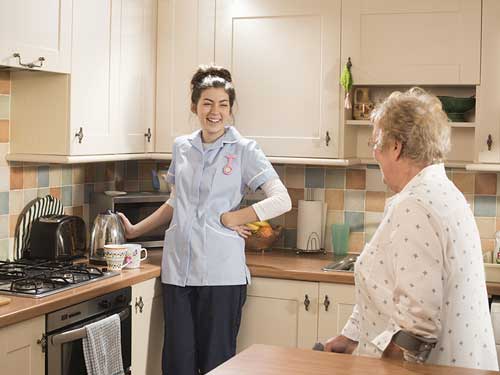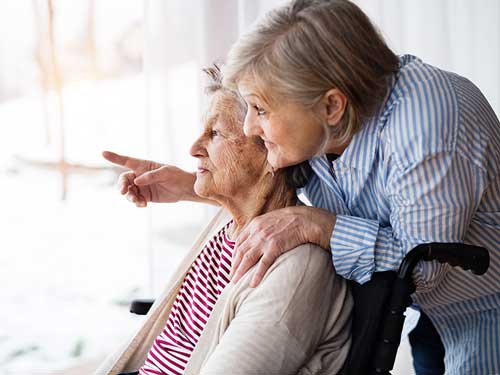




Individuals should be encouraged to continue to live at home for as long as they are able. In order to facilitate this, some individuals may require care and support interventions to enable them to live as independently as possible. This encourages the individual to feel they still have some control over their lives.
Dylid annog unigolion i barhau i fyw gartref am gyhyd ag y gallant. Er mwyn hwyluso hyn, mae'n bosibl y bydd angen ymyriadau gofal a chymorth ar rai unigolion i'w galluogi i fyw mor annibynnol â phosibl. Mae hyn yn annog yr unigolyn i deimlo bod ganddo rywfaint o reolaeth dros ei fywyd.

There are many services that can help individuals stay in their own home for as long as possible.
Home care could include help with the following:
Home adaptations include:
Assistive technology could include:
Mae llawer o wasanaethau a all helpu unigolion i aros yn eu cartref eu hunain cyhyd ag y bo modd.
Galla gofal cartref gynnwys cymorth gyda'r canlynol:
Mae addasiadau yn y cartref yn cynnwys:
Gallai technoleg gynorthwyol gynnwys:

One factor common to all is the need to maintain the independence and control of their own lives and to avoid the idea of feeling institutionalised. There are a number of reasons why an individual may find that they are in need of short term or long term home care:
Un ffactor sy'n gyffredin i bawb yw'r angen i aros yn annibynnol, rheoli bywydau eu hunain ac osgoi'r syniad o deimlo'n sefydledig. Mae nifer o resymau pam y gallai unigolyn weld bod angen gofal cartref tymor byr neu dymor hir arno:

Individuals can benefit from having control over how they live their lives. This will allow them to maintain their preferred routines.
The benefits of being surrounded by personal possessions can aid memories and maintain an individual’s identity. It also allows them to receive visits from their families and friends without restrictions. All of this can contribute to their health and well-being.
Whilst an individual might be able to still carry out some lighter aspects of daily tasks, they may need support with other aspects of their lives. By only having support where it is needed, intervention is as unobtrusive as possible and the individual is able to maintain a sense of privacy and dignity.
For couples who wish to remain together in their own home, but one partner needs high levels of care, live-in care is available. This would allow the couple to focus on maintaining their relationship, whilst professionals provide the care required.
Gall unigolion elwa ar reoli'r ffordd y maent yn byw eu bywydau. Bydd hyn yn caniatáu iddynt gynnal eu trefn ddyddiol ddewisol.
Gall fod o fantais i unigolyn gael ei amgylchynu gan eiddo personol er mwyn ei helpu i gofio a chadw ei hunaniaeth. Mae hefyd yn eu galluogi i dderbyn ymweliadau gan aelodau o'u teulu a'u ffrindiau heb gyfyngiadau. Gall hyn i gyd gyfrannu at eu hiechyd a'u llesiant.
Er y gallai unigolyn barhau i gyflawni rhai agweddau ysgafnach ar dasgau dyddiol, efallai y bydd angen cymorth arno gydag agweddau eraill ar ei fywyd. Wrth ddim ond gael cymorth pan mae ei angen arno, mae ymyriad mor anymwthiol â phosibl a gall yr unigolyn gynnal ymdeimlad o breifatrwydd ac urddas.
Ar gyfer cyplau sy'n dymuno aros gyda'i gilydd yn eu cartref eu hunain, ond mae angen lefelau uchel o ofal ar un partner, mae gofal preswyl ar gael. Byddai hyn yn galluogi'r cwpl i ganolbwyntio ar gynnal eu perthynas, tra bod gweithwyr proffesiynol yn darparu'r gofal sydd ei angen.

There are many types of agencies and professionals that can provide support for individuals in their own homes.
Mae llawer o wahanol fathau o asiantaethau a gweithwyr proffesiynol sy'n gallu helpu unigolion i fyw yn eu cartrefi eu hunain.

The more help and support families/carers can provide then the less impact that will have on the resources that other services provide.
Care can be more personal, families/carers can share information that is vital to planning some of the services the individual might need, for example, knowing more about the changes that have occurred that have led to the individual needing some care and support at home.
They can provide both practical and emotional support for the individual and enable them to continue feeling safe and secure when receiving care in their own home.
Families/cares can take on some of the less physical aspects of care like shopping, financial support such as budgeting, taking the individual to appointments and checking that they are safe.
Po fwyaf o help a chefnogaeth y gall teuluoedd/gofalwyr ei ddarparu yna'r llai o effaith a gaiff ar yr adnoddau y mae gwasanaethau eraill yn eu darparu.
Gall gofal fod yn fwy personol, gall teuluoedd/gofalwyr rannu gwybodaeth sy'n hanfodol i gynllunio rhai o'r gwasanaethau y gallai fod eu hangen ar yr unigolyn, er enghraifft, gwybod mwy am y newidiadau sydd wedi digwydd sydd wedi arwain at yr angen am rhywfaint o ofal a chymorth yn y cartref.
Gallant ddarparu cymorth ymarferol ac emosiynol i'r unigolyn a'i alluogi i barhau i deimlo'n ddiogel wrth dderbyn gofal yn ei gartref ei hun.
Gall teuluoedd/gofalwyr ddilyn rhai o'r agweddau llai corfforol ar ofal fel siopa, cymorth ariannol megis cyllidebu, mynd â'r unigolyn i apwyntiadau a gwirio eu bod yn ddiogel.

Carers play an important role in supporting individuals to live at home.
The Social Services and Well-being (Wales) Act 2014 puts a duty on local councils to consider the support needs of carers.
Under the new Act individuals no longer need to be providing a substantial amount of care on a regular basis to be recognised as someone’s carer.
Carers now have an equal right to assessment for support as the individual they care for. They will also have more say about what support they need and where that support comes from.
They also have the right to say whether they are able or willing to continue caring for an individual.
Mae gofalwyr yn chwarae rhan bwysig yn y gwaith o gefnogi unigolion i fyw gartref.
Mae Deddf Gwasanaethau Cymdeithasol a Llesiant (Cymru) 2014 yn gosod dyletswydd ar gynghorau lleol i ystyried anghenion gofalwyr o ran cymorth.
O dan y Ddeddf newydd, nid oes angen i unigolion ddarparu llawer o ofal yn rheolaidd mwyach i gael ei gydnabod fel gofalwr rhywun.
Erbyn hyn mae gan ofalwyr hawl gyfartal i asesiad am gymorth â'r unigolyn y maent yn gofalu amdano. Byddant hefyd yn cael mwy o lais ynghylch pa gymorth sydd angen arnynt ac o ble y daw'r cymorth hwnnw.
Mae ganddynt hefyd yr hawl i ddweud a ydynt yn gallu neu'n fodlon parhau i ofalu am unigolyn.